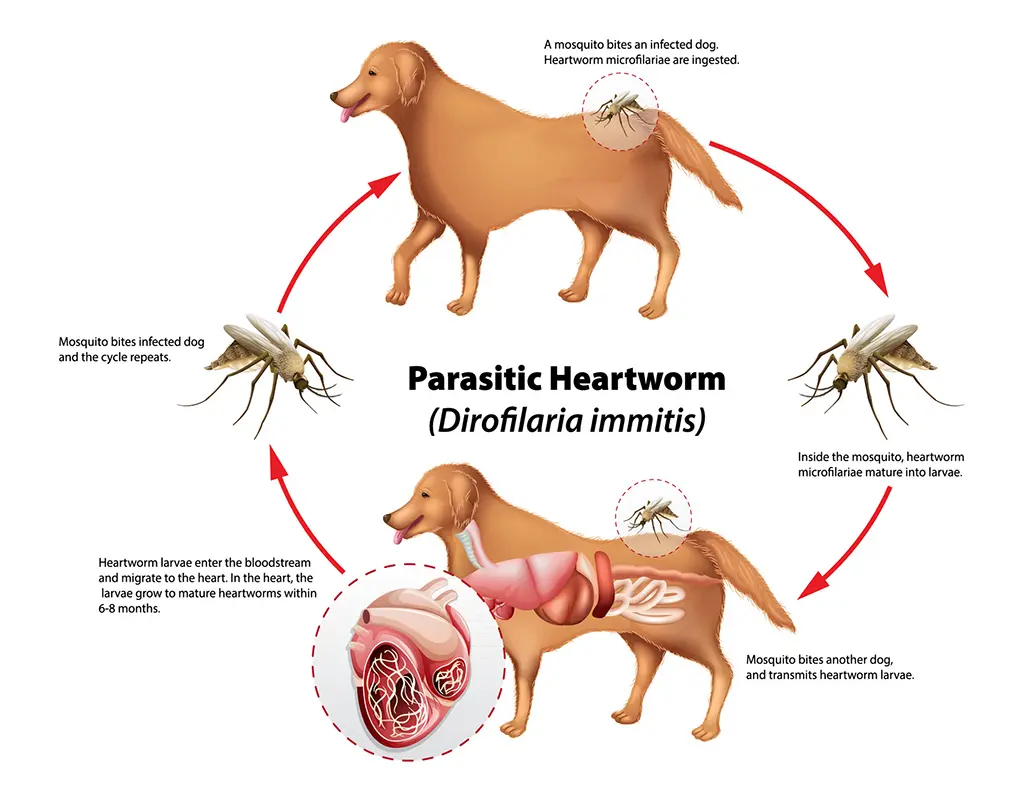Heartworms are a source of anxiety for pet parents. Due in part to climate and environmental changes, the past decade has seen an increase in the overall prevalence of heartworm infection. While the parasite can be found throughout the US, the Southeast has the highest rate of reported heartworm cases, leaving dogs in this region at particularly great risk.
Fortunately, there are steps you can take to protect your furbaby from the potentially devastating effects of heartworm infection before it starts.
Dirofilaria immitis, or heartworms, are parasitic worms that invade the hearts, lungs, and vascular systems of infected pets. These worms mature over 6-7 months and reproduce within organ systems. Adult heartworms resemble cooked spaghetti, with male worms measuring around 4-6 inches in length and larger females growing to be about a foot long. If left untreated, they will eventually cause heart, lungs, kidneys, or liver failure.
Like many parasites, heartworms are spread by mosquitoes. When a mosquito bites an infected animal with mature worms, it becomes a temporary host for pre-larval offspring, called microfilariae. When a carrier mosquito bites your pet, microfilariae are passed into their bloodstream through the bite wound.

Non-domestic animals, like coyotes and foxes, can also carry the parasite, so regions that have dense populations of mosquitoes and carrier animals tend to see the highest rates of infection.
Fortunately, heartworms cannot be transmitted by normally occurring contact between pets.
Heartworms take at least 6 months to reach maturity, and the early stages of infection may have few if any visible symptoms. As the disease progresses, dog parents may notice:
Worms are less common in cats, and they are less likely to survive beyond larval stages in feline hosts than in dogs. However, immature heartworms can still be devastating to your cat’s heart, lungs, and liver. For cats who do become infected, symptoms tend to be subtle until the later stages.
Common symptoms of heartworm infection in cats can include:
Unfortunately, the medications that successfully treat heartworms in dogs are fatal to cats. Because feline infections are untreatable, year-round preventive medication is the best way to keep your kitty safe.
Dogs with a mild or moderate case of the parasite have a generally good prognosis. Once a veterinarian confirms the presence of heartworms, they can be treated with injections of anti-parasitic medications over several months. Depending on your dog’s condition, additional treatments may be required to ensure that they can tolerate the death of the worms integrated into their organ systems.
More advanced infections can be addressed with surgery, but the prognosis is less optimistic.
For pet parents, the best course of action by far is getting their pet on an effective heartworm preventative. While many heartworm prevention medications have to be given monthly, 6 month heartworm prevention needs to be administered just twice a year.

The medications that successfully treat heartworms in dogs are fatal to cats. As a result, there is no current treatment for feline heartworms.
Pet parents are usually aware that dogs are vulnerable to the parasite but are less likely to be concerned about cats, especially when they aren’t allowed outside. Surprisingly, a North Carolina-based study revealed that 28% of heartworm-positive cats are indoor-only.
Currently, prevention is the best and only option for keeping kitties safe. Heartworm preventatives that are formulated especially for cats that can protect our feline friends from an untreatable infection.
There are a variety of FDA-approved chewable, injectable, and topical treatments that can offer dogs and cats year-round protection from heartworms.
Your vet will need to confirm that your pet is heartworm-free before recommending a course of preventative treatment. Because early intervention is associated with a better prognosis, the American Heartworm Society recommends annual testing for all pets.
Read up on some common myths about heartworm infection, and talk to your veterinarian about the best heartworm preventative and testing schedule for your furry friend.